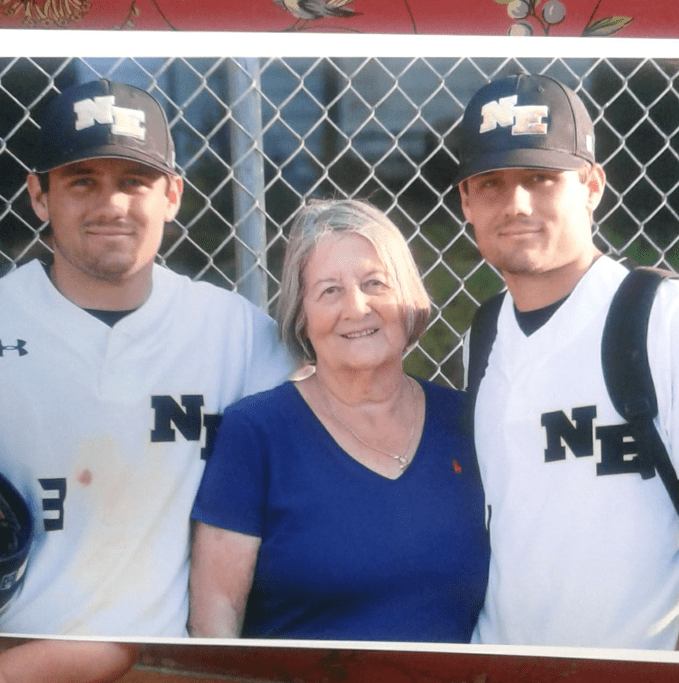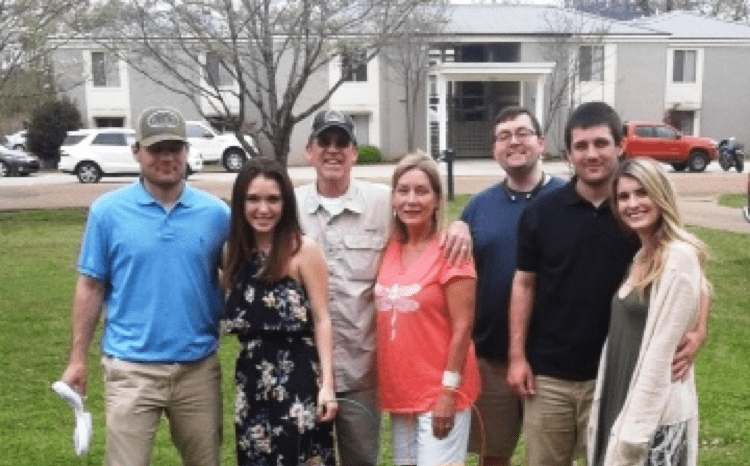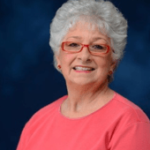*The latest installment in the Ole Miss Retirees features is former assistant to the Chancellor, Leone King. The organization’s mission is to enable all of the university’s faculty and staff retirees to maintain and promote a close association with the university. It is the goal of the Ole Miss Faculty/Staff Retirees Association to maintain communication by providing opportunities to attend and participate in events and presentations.
For anyone who knows Leone King, they will tell you she is the consummate professional known for always putting Ole Miss’ best foot forward as she represented the administration. Leone was a mentor, counselor, and advisor to many faculty, staff, and students through the years as she guided us all to be our best selves. Many sought her help and she was always willing to be of assistance in matters big and small, her many talents and skills as big as her heart.

Brown: Where did you grow up?
King: On November 27, 1937, in the small town of Ashland, Mississippi, I was born to Elizabeth Autry and Samuel Leon Davis. When I was three years old, we moved to Memphis, where we lived until I was in the sixth grade. The highlights of my years in Memphis were (1) accepting Christ as my Savior and (2) being chosen in the third grade to ride the float for Levi Elementary School in the Memphis Cotton Carnival parade. My mother made me a beautiful long yellow dress which I loved and which my daughters enjoyed years later. Our neighborhood in Memphis was so safe then that my parents allowed me to ride my bike to the corner store alone. I completed my education in Ashland. Highlights of my 6th through 12th grades were (1) being selected for the lead in an operetta, (2) being named captain of our girls’ basketball team my junior and senior years, (3) ranking first in my graduating class, and (4) meeting Elvis before he became popular.
Brown: When did your “Ole Miss story” begin? Who hired you?
King: My Ole Miss story began in January 1960. Mr. Hugh Clegg, then Assistant to the Chancellor (J.D. Williams) and Director of Development, hired me as his secretary. I worked for him three years while my children’s father, Robert L. King, finished his last two years of undergraduate work and a master’s degree. When I interviewed with Mr. Clegg, I did not know that he had been Assistant Director of the FBI under J. Edgar Hoover. When I learned that, I was scared to death of him. For a couple of weeks, when he would buzz for me to come into his office, I would literally jump in my chair. After I got to know him, however, I found him to be a kind and thoughtful boss, and I loved working for him. Mr. Clegg served as the University’s liaison with Attorney General Bobby Kennedy and his staff during the events surrounding the admission of Mr. James Meredith to Ole Miss. One of my duties was to register the media representatives who came to campus. I found them to vary greatly in attire and ethics.
In 1963, Bobby, our two daughters, Jeri and Gina, and I moved to Northwest Mississippi Community College (NWCC) in Senatobia for Bobby to assume a teaching position there. I had completed three years of work toward an Education degree at NWCC and the “W” and had taken one course per semester at Ole Miss while working for Mr. Clegg, so all I lacked was my practice teaching. The thing I remember most about my practice teaching at Batesville High School is that the news about President Kennedy’s assassination came over the loudspeaker at the school on November 22. President Reese McLendon hired me to teach at NWCC in 1964. I commuted to Ole Miss each summer, completing my master’s degree and 30 hours in a doctoral program.
In 1974, Mrs. Mary DeShazo Duvall, then Administrative Assistant to Chancellor Porter Fortune, called to advise me that she was retiring soon for health reasons and that she had recommended me to the Chancellor as a possible replacement. Although I had no desire to move my children at that point, I promised to go for the interview if called. Dr. Fortune offered me the position, and my three children — Jeri and Gina, who were teens, and Robert, who was four –and I moved to Ole Miss in January 1975. My salary that year was a whopping $16,000, and Personnel staff thought that was too much! I was privileged to serve with Dr. Fortune his last ten years, with Dr. Gerald Turner all eleven years of his Chancellorship, with Interim Chancellor Gerald Walton for one month, and with Dr. Robert Khayat his first three years as Chancellor. Including my service with Mr. Clegg, I worked at Ole Miss for 27 years.
Brown: What were some of your responsibilities in your role as Assistant to the Chancellor? What was your greatest challenge?
King: Every day in the Chancellor’s Office was different. That made my position extremely interesting. I would plan my day but invariably so many things would pop up that I seldom got through all I had planned. Some things were consistent: Of course, I was at the beck and call of the Chancellors and worked closely with them and the Executive Assistants to the Chancellor—Sydney Shaw and Drs. Tom Meredith, Les Wyatt, and Andy Mullins; I managed the office and the very capable people on our staff; I met with the Administrative Council and served on various committees; I worked with Patricia Huggins on plans and materials for special events involving the Chancellor; and the list could go on. The most rewarding part of my job was being able to help students, alumni, Board of Trustee members, faculty, and staff who called on our office with needs. My greatest challenge was not becoming bored with the paper work. Mounds of paper came into our office each day. I was responsible for the Chancellor’s response to correspondence that needed to be answered, whether the answer came directly from him, one of the Vice Chancellors, or me. Being sure that response was appropriate and error free was my responsibility, and it really upset me the few times we “messed up.”
Brown: You juggled many different roles at work. Tell us about some of the more memorable days at work.
King: Three particularly good days:
(1) the day Chancellor Khayat received word that the University of Mississippi’s application for a Phi Beta Kappa Chapter at Ole Miss had been approved. A Phi Beta Kappa Chapter had been a goal of the University long before I worked there, and I was thrilled that the quality of our Liberal Arts faculty and programs had been recognized by Phi Beta Kappa. Chancellor Khayat’s ability to raise millions of dollars for the Liberal Arts enabled the University to bolster faculty salaries, facilities, and scholarships, which helped meet Phi Beta Kappa requirements.
(2) the day that Leontyne Price came to the University as featured guest during the Women’s Centennial. No one thought she would accept our invitation, but Chancellor Fortune and Ms. Price’s brother had served together as Civilian Aides to the Secretary of the Army, and General Price encouraged his sister to come. She left feeling very good about the University.
(3) the day Chancellor Gerald Turner announced that the goal for the Campaign for Ole Miss had been exceeded. Chancellor Fortune had the original vision of what a large endowment could do for the University, but his health did not allow him to complete the “Journey into Excellence” that he and alumni Campaign Chairmen Paul McMullan and Richard Newman started. In 1985, Chancellor Turner came in with youthful vigor and great fundraising experience and, with the help of Dr. Khayat, Dr. Fruge, and alumni leaders, was able to increase the University’s endowment to more than $25 million. When Dr. Khayat, who is so beloved by the Ole Miss family, became Chancellor, he was able to build the endowment to a level to be recognized nationally.
A sad day:
We lost several students while I was in the Chancellor’s Office and each brought sadness to all of us. The worst tragedy, however, occurred the day the Chi Omegas were hit by a pickup on Highway 6 while they were walking between Batesville and Oxford as part of a fundraising activity. Five girls were killed and several were seriously wounded. I recall vividly that Chancellor Turner, Dr. Tom Meredith, and I were working in the Chancellor’s office when the call came in. They immediately rushed to the hospital, and I stayed to help field calls that started coming in to our office. That was a day none of us will ever forget, I am sure.
A strange occurrence:
The strangest thing that happened during my tenure in the Chancellor’s Office was a phone call I received early one morning. The man on the line asked, “Is the Chancellor the Anti-Christ?” The caller had a very heavy accent, and I thought I must have misunderstood, so I asked him to please repeat what he had said. He asked the same question. This happened during Chancellor Turner’s tenure, and all who knew Dr. Turner were aware that he was a devout Christian. I assured the caller than the Chancellor was not the Anti-Christ, and I asked him why he thought he might be. He said he heard on the radio that a plane had flown over the campus and the pilot noted the sidewalks in the Circle formed a Hexagram – a sign of the devil. He called our office because of that radio program.
Brown: You have been a mentor to many, me included. Please talk about someone who influenced you.

King: My mother was the greatest influence on my life. She was a godly woman who sacrificed much to give me opportunities, and she taught me to love the Lord and have strong character. In my teen years, my English teacher, Mrs. Nan Renick, had a great impact on my preparation for college. My Sunday School teacher in those same years was Mrs. Lillie Jean Renick. She helped to keep me grounded in the word during the time I was becoming a young woman.
The person who served as my professional mentor was Mrs. Mary DeShazo Duvall. When I worked for Mr. Clegg, his office was directly across the hall from Chancellor J. D. Williams’ office. I was young and inexperienced. Mrs. Duvall took me under her wing and taught me so much. She was a perfectionist in all that she did, and her standard was what I tried to attain when I followed her in the Chancellor’s Office. I will always be grateful for her encouragement and support.
Brown: Ole Miss went from being a small, liberal arts university to become a much larger “American public research university” with multiple campuses. In your opinion, what factors contributed to this growth and change?
King: Leadership and vision of the Chancellors; dedicated Vice Chancellors, faculty and staff; generous and devoted alumni who gave time and resources to help achieve goals set by the Chancellors; and increasingly bright and accomplished students have all contributed to this growth. Congressional funding for buildings and research projects made possible by Senators Cochran, Lott, and Wicker greatly enhanced the campus. Private funds have made a vast difference in facilities, program resources, salaries, scholarships to attract outstanding students, etc. One academic measure which has changed dramatically since my retirement is the research standing of the University. For years, Oxford campus research funding was much lower than that of the Medical Center campus. When Dr. Alice Clark became Vice Chancellor for Research, faculty responded to her leadership, and research efforts on the Oxford campus increased and began to be recognized and rewarded. It is wonderful to see the University listed as a major research university now.
Brown: You’ve always been very active in the community and in your church. What has kept you busy since your retirement? Do you have any hobbies?
King: When I retired, I cut back on professional memberships and community activities. I do still teach a Sunday School class for women my age and really enjoy that. For several years I enjoyed volunteering at the hospital. After I tripped and broke my hip while volunteering, my children asked that I stop. Doing things for and with my grandchildren has been my primary activity since retirement. I have five grandsons – Hunter, Eli, and John Murphree and Memphis and Ryder Val King. I try to attend as many events in their lives as possible and to be a mentor to them when I can. This month my daughters and I will be visiting Gulf Shores for a brief vacation. I really look forward to that. I love traveling but seldom travel. Having time to do what I want when I want to do it is a special benefit of retirement.
Brown: Do you have a favorite quote? If so, why is it a favorite?
King: Most of my favorite quotes are from the Bible. I tried to make Colossians 3:23 the guiding quote for my work: “Whatever you do, work at it with all your heart, as working for the Lord, not for men.” I love John Wayne movies. One of my favorite quotes by him is: “Courage is when you are scared but you saddle up anyway.” An appropriate quote for me today is one by Douglas McArthur: “Years may wrinkle the skin, but to give up interest wrinkles the soul.” I hope I never give up interest in life and other people.

Brown: Is there anything else you’d like to talk about?
King: Yes. I am grateful for the opportunities Ole Miss provided me as an employee, most important of which was the faculty-staff scholarship which made it possible for my three children to earn a bachelor’s degree without incurring a large debt. I also appreciate the friendship of fellow administrators, faculty, staff, students, Board members, and alumni, many of whom I still see or hear from on occasion. Those friendships are one of the greatest benefits of working at Ole Miss. Our state retirement system, the Public Employees’ Retirement System of Mississippi (PERS) is another benefit for which I am grateful. The retirement check I receive each month makes all the difference in my quality of life. I am thankful that our PERS leaders have invested wisely the money we employees and the University have paid into the system.
 Bonnie Brown is a retired staff member of the University of Mississippi. She most recently served as Mentoring Coordinator for the Ole Miss Women’s Council for Philanthropy.
Bonnie Brown is a retired staff member of the University of Mississippi. She most recently served as Mentoring Coordinator for the Ole Miss Women’s Council for Philanthropy.
For questions or comments, email hottytoddynews@gmail.com.

